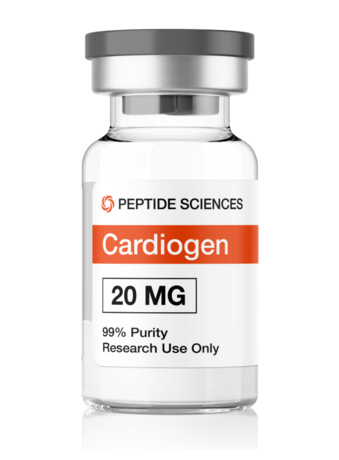Cardiogen is a short peptide with well-known bioregulator properties. You can buy it in our online store at a very attractive price.
Research shows that its main effect is on fibroblasts, cells responsible for tissue repair and scar formation throughout the body. Although attention to cardiogen was focused on its role in various cardiovascular diseases (hence the name), studies show that its ability to change the activity of fibroblasts has potential advantages in various tissues. In addition, cardiogen appears to be a synergistic peptide that enhances the benefits of some standard treatment methods and thereby improves long-term results while reducing side effects. Finally, preliminary studies on rats show that cardiogen can increase the rate of apoptosis in tumor cells.
Cardiogen and the heart
In the heart, cardiogen appears to stimulate the proliferation of cardiomyocytes while simultaneously slowing down the growth and development of fibroblasts.
This leads to a reduction in scarring and an improvement in long-term outcomes in relation to heart remodeling leading to heart failure. In addition, it turns out that cardiogen in a dose of 20 mg can reduce the expression of p53 protein and thereby reduce the rate of apoptosis.
Cardiogen and cancer
Although cardiogen reduces apoptosis in heart cells by suppressing the expression of p53, it can have the opposite effect in tumor cells. Studies on rat models of sarcoma M-1 show that the levels of apoptosis in tumor cells are higher after the introduction of cardiogen.
Moreover, the effect depends on the action, which indicates the reality of the biological effect. The peptide apparently enhances apoptosis of tumor cells and may be to some extent selective in relation to tumor cells due to their increased and unusual blood supply. This can make cardiogen a targeted treatment for at least some types of cancer. In addition, if the peptide enhances the effect of standard methods of cancer treatment (as it happens in the treatment of cardiovascular diseases), then it can be a very powerful addition to the arsenal of fighting cancer.
Cardiogen 20 mg and prostate
• Studies of tissue cultures show that cardiogen together with several similar peptides changes the expression of signaling factors in prostate fibroblasts. The levels of these signaling factors are important for creating a favorable microenvironment within tumors and can contribute to both the development and progression of prostate cancer.
Hard evidence shows that the synthesis of these markers is significantly altered in senescent and senescent fibroblasts, which may explain why prostate cancer is almost universally found in older men but almost never found in younger men. In fact, studies show that Cardiogen can normalize the levels of these signaling molecules to match or even improve upon those seen in young cell cultures, suggesting that Cardiogen may be effective both in preventing prostate cancer and in controlling its progression once it has developed. .
Cardiogenic summary
Cardiogen 20 mg, although less studied than some other bioregulators, apparently has a powerful effect on many tissues of the body, including the heart and prostate. In addition, the peptide may be useful in the treatment of some types of cancer, especially sarcoma. Currently, the greatest benefits of cardiogen are manifested in heart attacks, hypertension, and chronic heart failure, where the peptide not only provides benefits by itself, but also acts synergistically with traditional treatment methods.
Cardiogen shows minimal side effects, good oral and excellent subcutaneous bioavailability in mice. The dosage per kg for mice does not apply to humans. Cardiogen sold by
Peptide Sciences is intended only for educational and scientific research, and not for human consumption. Buy Cardiogen only if you are a licensed researcher.




There are currently no reviews for this product.
Your review will be the first.
Tell other users of the site about the advantages and features of the product, share your impressions and expert opinion.